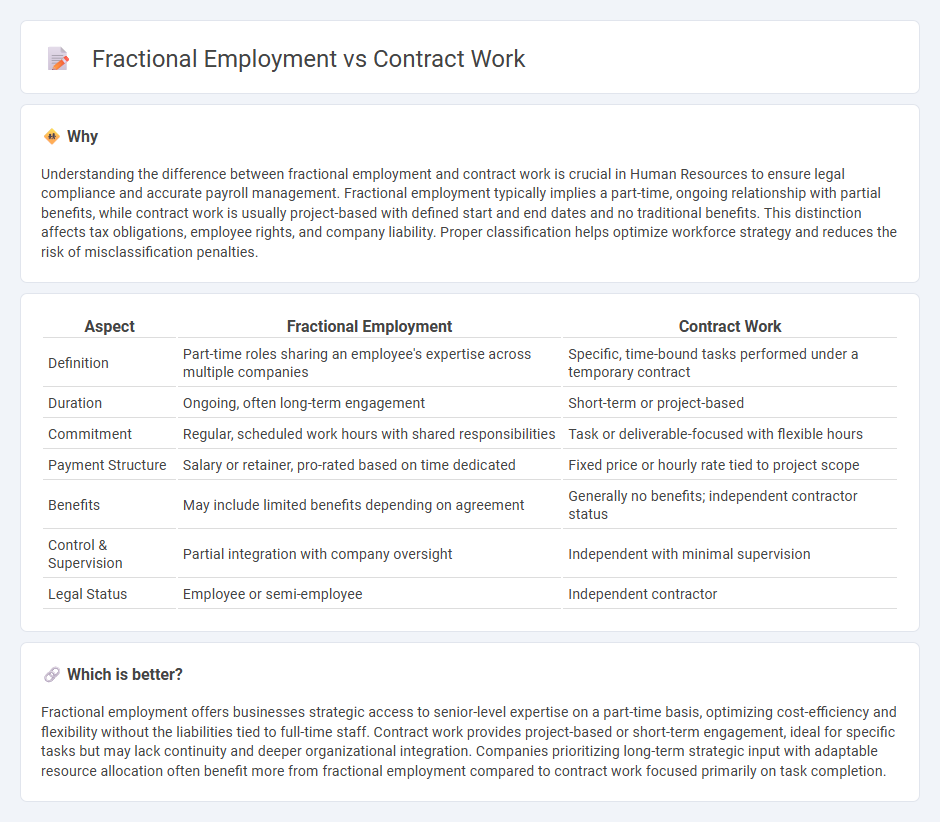
Fractional employment offers organizations access to specialized expertise on a part-time basis without the commitment of full-time hiring, often resulting in cost-effective talent management. Contract work typically involves fixed-term agreements with clear deliverables and timelines, providing flexibility for project-specific needs. Explore the key differences and benefits of fractional employment versus contract work to optimize your HR strategy.
Why it is important
Understanding the difference between fractional employment and contract work is crucial in Human Resources to ensure legal compliance and accurate payroll management. Fractional employment typically implies a part-time, ongoing relationship with partial benefits, while contract work is usually project-based with defined start and end dates and no traditional benefits. This distinction affects tax obligations, employee rights, and company liability. Proper classification helps optimize workforce strategy and reduces the risk of misclassification penalties.
Comparison Table
| Aspect | Fractional Employment | Contract Work |
|---|---|---|
| Definition | Part-time roles sharing an employee's expertise across multiple companies | Specific, time-bound tasks performed under a temporary contract |
| Duration | Ongoing, often long-term engagement | Short-term or project-based |
| Commitment | Regular, scheduled work hours with shared responsibilities | Task or deliverable-focused with flexible hours |
| Payment Structure | Salary or retainer, pro-rated based on time dedicated | Fixed price or hourly rate tied to project scope |
| Benefits | May include limited benefits depending on agreement | Generally no benefits; independent contractor status |
| Control & Supervision | Partial integration with company oversight | Independent with minimal supervision |
| Legal Status | Employee or semi-employee | Independent contractor |
Which is better?
Fractional employment offers businesses strategic access to senior-level expertise on a part-time basis, optimizing cost-efficiency and flexibility without the liabilities tied to full-time staff. Contract work provides project-based or short-term engagement, ideal for specific tasks but may lack continuity and deeper organizational integration. Companies prioritizing long-term strategic input with adaptable resource allocation often benefit more from fractional employment compared to contract work focused primarily on task completion.
Connection
Fractional employment and contract work both provide flexible staffing solutions catering to dynamic business needs by enabling companies to hire skilled professionals for specific projects or limited durations. Fractional employees often work part-time across multiple organizations, offering expertise without full-time commitment, while contract workers are engaged for predefined periods under contractual agreements. This synergy allows organizations to optimize human resources, reduce overhead costs, and quickly adapt to changing market demands.
Key Terms
Employment Agreement
Employment agreements for contract work typically outline specific project scopes, fixed durations, and payment terms tied to deliverables, emphasizing flexibility and short-term commitment. In contrast, fractional employment agreements formalize part-time roles with ongoing responsibilities, regular compensation, and benefits, reflecting a long-term partnership with defined roles. Explore detailed comparisons to understand which agreement structure best suits your business needs.
Work Hours Commitment
Contract work typically involves a predetermined number of work hours or deliverables agreed upon in the contract, allowing for flexible scheduling but limited long-term commitment. Fractional employment often entails a consistent allocation of hours per week or month, representing a partial yet ongoing work commitment within an organization. Explore the distinctions in work hours commitment to determine the best fit for your business needs.
Scope of Services
Contract work typically involves a specific, well-defined scope of services agreed upon for the duration of a project, often with clear deliverables and deadlines. Fractional employment offers broader, ongoing support across multiple functions or leadership roles, providing companies with part-time access to high-level expertise without the commitment of full-time hires. Explore how these work models can optimize your business needs and resource management.
Source and External Links
What Is a Contract Job, and How Does It Work in 2025? - This article explains how contract jobs work, highlighting their benefits for both businesses and individuals, including flexibility and skill-building opportunities.
What Is a Contract Employee? - This guide outlines common contract positions across various industries and provides insights into hiring and managing contract employees.
Contractor Opportunities | The Cigna Group Careers - The Cigna Group offers contract opportunities for those interested in temporary assignments or transitioning to full-time roles, with options for flexibility and potential benefits.
 dowidth.com
dowidth.com